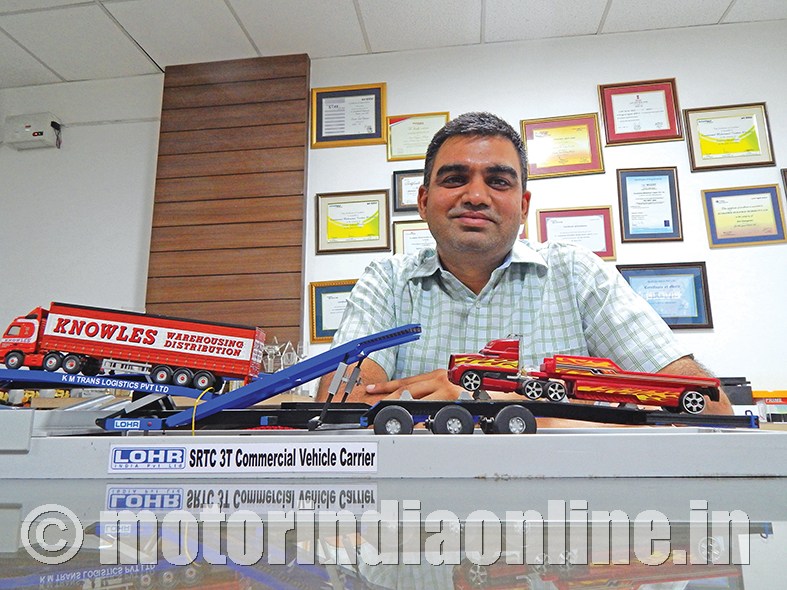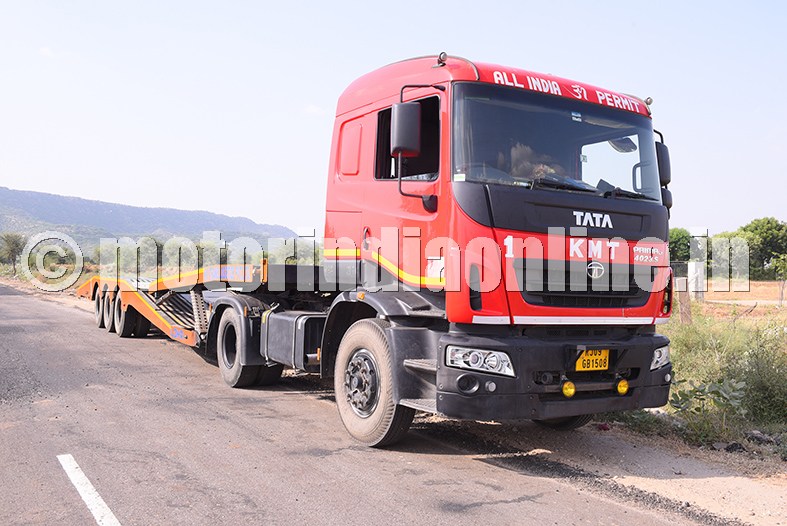Jaipur-based KM Trans Logistics Pvt. Ltd. is a pioneer in car, chassis and steel/bulk transportation with pan-India operations. Established in 1988, the operator has a sizeable fleet of 1,450 vehicles in its stable – a whopping 1,320 of them from Tata Motors, 105 from Ashok Leyland, 20 from Mahindra and 5 from Eicher.

We find out from Mr. Amit Chandwar, Director, KM Trans Logistics, about what his firm has in store for the future and how the GST buzz is likely to transform cargo movement in the country.
Excerpts:
FY17 performance
FY 2016-17 was remarkable for our company. Even after demonetization we were able to achieve 30 per cent growth in overall turnover. We had inducted over 300 trailers which took our total fleet size to 1,450 trailers.
Plans and outlook for FY18
Since BS-IV has been mandated across the country, April was a slow month for the CV sector but from May onwards the demand has become normal. As for the rest of the year, since GST is about to be introduced, the demand might slow down for the next two months post which we expect it to become normal and hope to be able to pick up growth at our company too.
GST impact on logistics sector
No doubt, GST is coming in like a giant in the Indian market. For the first few months, the movement might get slower due to understanding of implementation of rules. In the long term, we believe GST will have a positive impact on the overall economy of the country. Companies in the logistic sector will be benefitted in terms of uniform rate for the whole industry which will create opportunities for transporters. GST will lead to a leaner logistic industry which will lead to greater efficiency.
Company’s GST-readiness
We are preparing our team to be updated with the rules of GST so that they can be ready to face the consequences once GST gets implemented. Since multiple check points at state borders will be removed, there will be faster flow of goods as the transit time will be reduced, since the time lost in fulfilment of documentation will be saved.
Technology adoption
We have implemented a number of fleet management solutions for vehicle tracking, route calculation, driver route diversification, restricting night driving, high-speed tracking, KM mapping, km calculation, tracking unwanted stoppage, harsh braking, etc., for preventive maintenance and regular connectivity with the drivers 24×7.
Tackling driver shortage
Driver shortage has always been a critical issue for transport companies. Since drivers play the most important role in the transport business, it is essential for transporters like us to retain our drivers. At KM Trans, we offer the following benefits for our drivers:
* Drivers Training Programme by professionals
* Eye and health check-up camps
* Accident Insurance of Rs. 20,00,000 for each driver
* Opening of Bank Account
* Festival gifts and rewards
The benefits given to the drivers build trust among them towards the company and they remain with us even during tough and challenging circumstances.
Factors that would drive logistics sector growth
India is one of the fastest growing economies in Asia and the entire world, especially in the transport and logistics industry space. The top three bright spots that we believe will drive growth in the logistics and transport sector are:
* GST: India will become a single market and there will be same tax rates pan-India. The inter-State tax burdens will be removed. There will be fewer but larger warehouses which will lead to cost-saving, enhancing the scope of transportation.
* Infrastructure development: Infrastructure development will be another key driver of the Indian economy. For growth of the logistics sector, it is very important to have a strong infrastructure. The Government is focusing a lot on developing good infrastructure in terms of roads, bridges, tunnels, flyovers, etc., which will give robust growth to the logistic industry in the country.
* Digitization: Market trends are driving growth in logistics while technological advances are opening up new ways for the industry to meet the increased demand. For better growth, it is essential to opt for digitalization. From bagging business orders to tracking of vehicles and also making payments including government dues through digital mode will drive faster growth across the industry.
